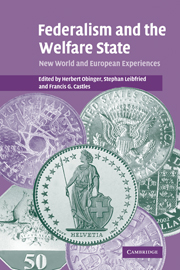Book contents
- Frontmatter
- Contents
- List of figures
- List of tables
- List of contributors
- Preface
- Note on illustrations
- 1 Introduction: federalism and the welfare state
- Part 1 New World experiences
- Part 2 European experiences
- 5 Austria: strong parties in a weak federal polity
- 6 Germany: co-operative federalism and the overgrazing of the fiscal commons
- 7 Switzerland: the marriage of direct democracy and federalism
- Part 3 Conclusion
- Index
6 - Germany: co-operative federalism and the overgrazing of the fiscal commons
Published online by Cambridge University Press: 22 September 2009
- Frontmatter
- Contents
- List of figures
- List of tables
- List of contributors
- Preface
- Note on illustrations
- 1 Introduction: federalism and the welfare state
- Part 1 New World experiences
- Part 2 European experiences
- 5 Austria: strong parties in a weak federal polity
- 6 Germany: co-operative federalism and the overgrazing of the fiscal commons
- 7 Switzerland: the marriage of direct democracy and federalism
- Part 3 Conclusion
- Index
Summary
Introduction
Conventional wisdom strongly suggests that federalism is inimical to high levels of social spending. Two arguments are prominent in this context: a veto point thesis and a ‘competition of jurisdictions’ thesis. The veto point thesis is quite straightforward: federal systems have more veto points than unitary systems ceteris paribus. This increases the probability that groups opposed to welfare state expansion can exert some influence in the legislative process. Veto points would then give these groups the opportunity to block or substantially water down redistributive legislation. ‘Competition of jurisdiction’ arguments hold that welfare redistribution is limited in federal systems because those who would pay more than they would gain in a given jurisdiction (high income earners, ‘capital’) can credibly threaten to exit highly redistributive jurisdictions and join those that are less égaliste. At the same time, those who gain more than they would pay (e.g. low income earners) are attracted to regions with higher levels of redistribution and these would therefore develop into ‘welfare magnets’. Thus, a redistributional policy stance is self-defeating in a federal context.
Indeed, many econometric studies of the determinants of welfare state spending have found that federalism exerts a statistically significant, stable and negative influence on social spending. Prominent country cases are Switzerland and the United States, both strongly federalist countries and historically, prominent welfare ‘laggards’ (although since 1980 Switzerland has moved rapidly from laggard to leadership status).
- Type
- Chapter
- Information
- Federalism and the Welfare StateNew World and European Experiences, pp. 222 - 262Publisher: Cambridge University PressPrint publication year: 2005
- 24
- Cited by

